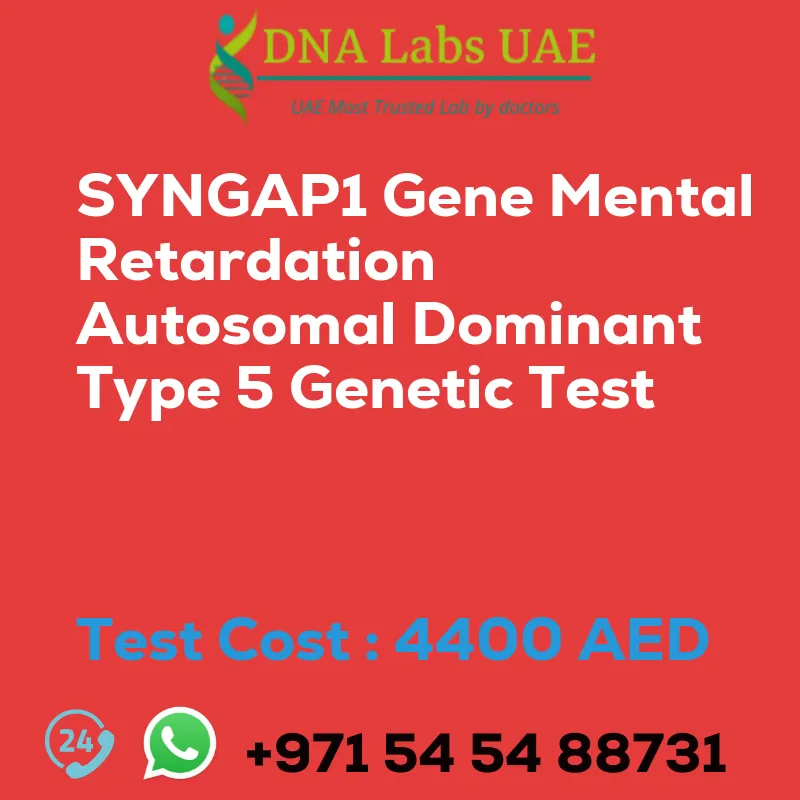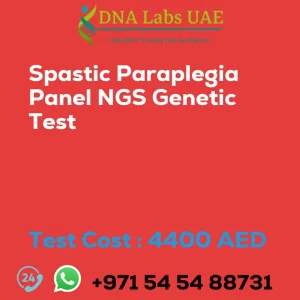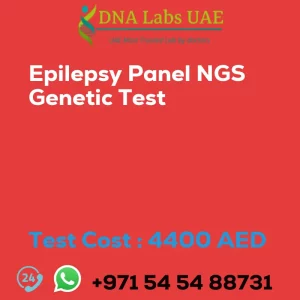SYNGAP1 Gene Mental Retardation Autosomal Dominant Type 5 Genetic Test
Welcome to DNA Labs UAE, a leading genetic lab offering comprehensive genetic testing services. In this blog, we will discuss the SYNGAP1 Gene Mental Retardation Autosomal Dominant Type 5 Genetic Test.
Test Components and Price
The SYNGAP1 Gene Mental Retardation Autosomal Dominant Type 5 Genetic Test is priced at 4400.0 AED.
Sample Condition
The sample condition required for this test is either blood, extracted DNA, or one drop of blood on FTA Card.
Report Delivery
The report for this test will be delivered within 3 to 4 weeks.
Method
The SYNGAP1 Gene Mental Retardation Autosomal Dominant Type 5 Genetic Test utilizes NGS (Next-Generation Sequencing) technology.
Test Type
This test is specifically designed to diagnose neurological disorders.
Doctor
A neurologist will oversee and interpret the results of this genetic test.
Test Department
This test falls under the Genetics department.
Pre-Test Information
Prior to undergoing the SYNGAP1 Gene Mental Retardation Autosomal Dominant Type 5 Genetic Test, it is recommended to provide the clinical history of the patient. Additionally, a genetic counseling session will be conducted to draw a pedigree chart of family members affected with SYNGAP1 Gene Mental Retardation Autosomal Dominant Type 5.
Test Details
The SYNGAP1 gene is associated with a neurodevelopmental disorder called mental retardation, autosomal dominant type 5 (MRD5). Individuals with MRD5 typically exhibit intellectual disability, delayed speech and language development, and behavioral issues such as autism spectrum disorder.
NGS genetic testing is a powerful tool used to analyze multiple genes simultaneously and identify mutations or variations that may be responsible for a particular disorder. In the case of MRD5, NGS genetic testing can detect mutations or variations in the SYNGAP1 gene, aiding in the diagnosis of this neurodevelopmental disorder.
During NGS genetic testing, the DNA of an individual is sequenced using a blood or saliva sample. This allows for the identification of any genetic changes that may be relevant to the disorder being investigated. The results of this test can provide a definitive diagnosis, help understand the underlying cause of the disorder, and potentially guide treatment options or genetic counseling for affected individuals and their families.
It is crucial to note that genetic testing for MRD5 or any other disorder should be conducted and interpreted by qualified healthcare professionals, such as geneticists or genetic counselors, who can provide appropriate guidance and support.
| Test Name | SYNGAP1 Gene Mental retardation autosomal dominant type 5 Genetic Test |
|---|---|
| Components | |
| Price | 4400.0 AED |
| Sample Condition | Blood or Extracted DNA or One drop Blood on FTA Card o |
| Report Delivery | 3 to 4 Weeks |
| Method | NGS Technology |
| Test type | Neurological Disorders |
| Doctor | Neurologist |
| Test Department: | Genetics |
| Pre Test Information | Clinical History of Patient who is going for SYNGAP1 Gene Mental retardation, autosomal dominant type 5 NGS Genetic DNA Test A Genetic Counselling session to draw a pedigree chart of family members affected with SYNGAP1 Gene Mental retardation, autosomal dominant type 5 |
| Test Details |
The SYNGAP1 gene is associated with a neurodevelopmental disorder called mental retardation, autosomal dominant type 5 (MRD5). This disorder is characterized by intellectual disability, delayed speech and language development, and behavioral issues such as autism spectrum disorder. NGS (Next-Generation Sequencing) genetic testing is a type of genetic testing that analyzes multiple genes simultaneously to identify mutations or variations that may be responsible for a particular disorder. In the case of MRD5, NGS genetic testing can be used to identify mutations or variations in the SYNGAP1 gene that may be causing the neurodevelopmental disorder. NGS genetic testing involves sequencing the DNA of an individual, usually through a blood or saliva sample, to identify any genetic changes that may be relevant to the disorder being investigated. This can help in providing a definitive diagnosis, understanding the underlying cause of the disorder, and potentially guiding treatment options or genetic counseling for affected individuals and their families. It’s important to note that genetic testing for MRD5 or any other disorder should be conducted and interpreted by qualified healthcare professionals, such as geneticists or genetic counselors, who can provide appropriate guidance and support. |








